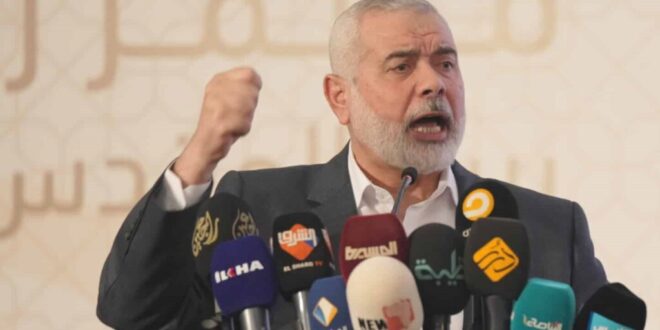Latest Developments
Hamas rejected the latest Gaza ceasefire proposal on April 4, refusing to compromise on its maximalist position. “We are committed to our demands,” Hamas chief Ismail Haniyeh said. Those demands include a permanent ceasefire, Israel’s complete withdrawal from the Gaza Strip, the return of Palestinians displaced from northern Gaza, and an “honorable prisoner exchange deal,” Haniyeh said. Jerusalem has repeatedly made clear that any deal that leaves Hamas intact is unacceptable.
Israeli Prime Minister Benjamin Netanyahu greenlighted the latest round of Egyptian- and Qatari-mediated talks on March 29, giving the Israeli team what his office described as “room to operate” in negotiations. Jerusalem accepted the latest proposal, which would have seen Israel temporarily pause its counteroffensive in Gaza and Hamas free the remaining hostages.
Expert Analysis
“Hamas has said that it is unwilling to back down from its outrageous demands. Since Yahya Sinwar and Mohammad Deif understand their days are numbered, their incentive to make a deal is limited or possibly nonexistent. They seem to be mercilessly dragging the hostage families through this process over and over again just to remain in the headlines.” — Enia Krivine, Senior Director of FDD’s Israel Program and National Security Network
“Israel wants to negotiate a hostage release before finishing off Hamas. Hamas wants to survive. The more Hamas leaders believe they will survive without giving up their leverage — hostages — the more they will hold out. The more they believe they have no other choice, the more seriously they will negotiate.” — Richard Goldberg, FDD Senior Advisor
Hamas Turns Down Four Ceasefire Offers
Hamas rejected previous ceasefire proposals in December and January. In February, the White House expressed hope that Hamas had scaled back its demands, but the terrorist group continued to dig in its heels. In late March, Israel agreed to pause its counteroffensive in Gaza for six weeks and release approximately 700 Palestinian prisoners in exchange for 40 Israeli hostages. Hamas rejected that offer on March 26. Israeli officials claimed that Hamas had sabotaged negotiations by trying to turn the proposed ceasefire into the restoration of the status quo ante.
Israeli officials attributed Hamas’s position to efforts by the group’s Gaza leader, Yahya Sinwar, to keep tensions high during Ramadan, with a view to provoking escalation. They also suggested that Hamas’s position hardened after the United States abstained from a UN Security Council vote on March 25, tacitly allowing the council to pass a resolution that called for a ceasefire without explicitly conditioning it on a hostage release.
130 Hostages Remain in Gaza
Hamas released 81 Israeli hostages during a week-long pause in November in exchange for 240 Palestinian prisoners. Additionally, Hamas released 23 Thai nationals, one Filipino, and three Israeli-Russian dual citizens under separate arrangements with Bangkok, Manila, and Moscow. The pause collapsed on December 1, when Hamas refused to provide a list of the remaining women and children in captivity and resumed launching rockets at Israel. On February 12, Israeli special forces rescued two hostages — Fernando Marman, 61, and Louis Har, 70 — from Rafah in southern Gaza. Approximately 130 hostages remain in Gaza, 34 of whom Israel believes are no longer alive.
 Eurasia Press & News
Eurasia Press & News




